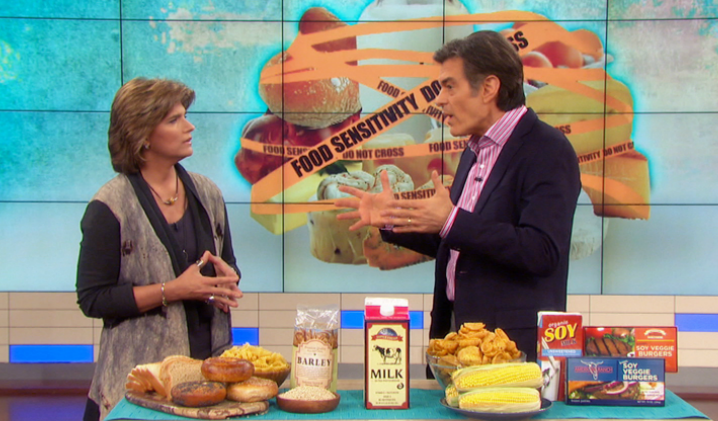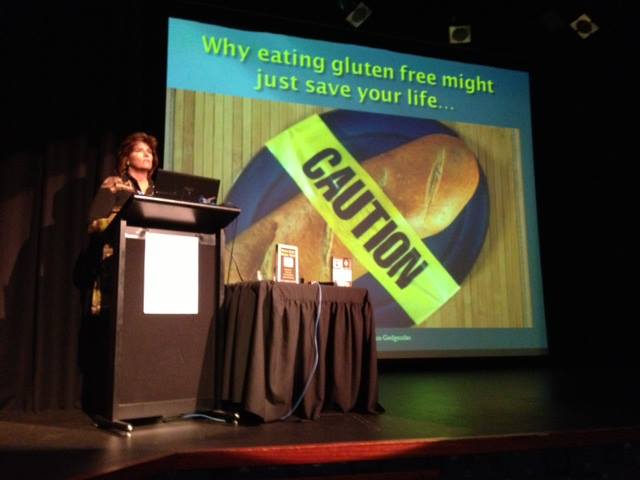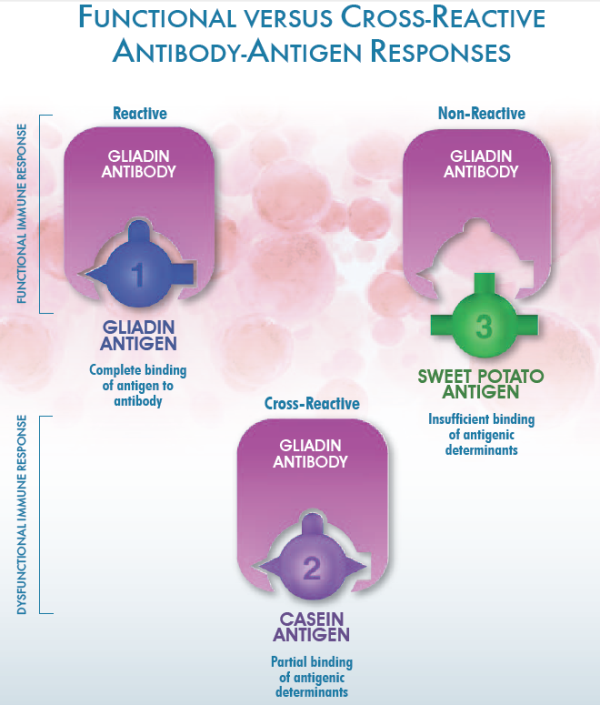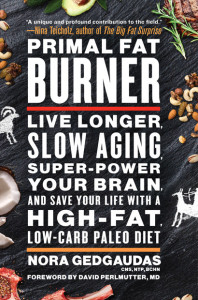So less than a week ago I was minding my own business, doing some light, casual (NOT) continuing education in the areas of brain chemistry and functional neurology when an email came through on my iPhone from the producers at the Dr. Oz Show. As if my brain wasn’t overloaded in the first place!
“Can you do the show this coming Friday?” they asked…HUH?
From that moment forward I felt like Dorothy getting sucked up into a category F5 tornado, whisked up into a cloud of whirling chaos and ultimately deposited 3000 miles away (virtually overnight) into “The Land of Oz”.
The show was originally meant to focus on food sensitivities and mental health, with additional focus on the phenomena of leaky gut and leaky blood-brain barrier commonly driving these kinds of issues. Normally, I can talk about all this in my sleep… And for those that know me, they will agree when I say I can talk about this pretty much all day without even coming up for air. But this was the alien world of mainstream media, sound-bites, advertisers, demographics and extremely limited blocks of time. Encapsulating this rather complex and involved– but incredibly important and timely subject is nearly impossible to do with any due justice. That’s simply the nature of the beast. That said the playful use of props and demonstrations were probably helpful for many viewers for at least setting up a preliminary stage for understanding something that we all need to know about. I’m hopeful that my own contribution to the show was able to inspire the audience to want to know a bit more.
Toward that end, for those that really do want to know more, here are a few things I would have very much liked to have shared with the audience on the show that there just simply wasn’t time for. Hopefully this is a helpful next step for those of you wanting to crack your own “food sensitivity code”.
In preparation for the show and determining what would actually be presented, I found I was actually being restricted from using the word “gluten” during the taping, as this was a topic that had been covered on recent shows and they didn’t want audience members to see the show content as being too repetitive. The fact is, however, that gluten really is the granddaddy food sensitivity of them all. It is the main culprit behind dietary grains and wheat (contained also in most commercial processed foods, some medications, shampoos and other personal care products) and is what I like to call a “gateway food sensitivity” that frequently opens the door to the creation of many, many others.
For starters here, I’d like to refer you to another article I have written in this blog titled: “What Is Gluten and Why Should We Care?”. The article is filled with incredibly useful and detailed information that everyone who cares about their health should know. I strongly suggest reading it. Trust me…you’ll thank me later.
One subject related to this we did not have time on the show to touch upon, but is really important to mention is the cutting edge subject of something known as “cross-reactivities”.
Here is why these are important for you to know about:
You may decide to embark upon a gluten-free diet (basically avoiding foods containing wheat rye and barley) as a way of eliminating this suspected culprit in order to figure out whether it’s a problem for you. This is what elimination diets are all about: you pick one or more foods that may be known as common food sensitivities you suspect may be problematic for you and you avoid them completely for a period of no less than two weeks to see how you feel (at least in theory). It can take eight days or more for antibody reactions in the body to begin to calm down enough to start to notice a difference (which is why two weeks is stated as the minimum time needed). It can take fully 6-weeks of total avoidance for antibodies to ultimately disappear. This doesn’t mean these foods become OK for you after that, though, it just means they aren’t reacting in you and causing damage as long as you stay away from them. If you eat the food again the antibodies and inflammation come raging back, so it isn’t OK to just go back to eating them again once you start to feel better. The truth is that 2 weeks abstinence may not be enough for some people. A better goal would actually be closer to six weeks–or better yet even 6 months to really allow some noticeable healing to occur, but this is a hard sell for many folks). Sometimes it is recommended that you reintroduce the suspected food at the end of the two week elimination period to see if there’s a noticeable adverse reaction (referred to by nutritionists as the “elimination/provocation” approach). In the case of gluten, in my opinion, it is a very, very bad idea to reintroduce it again simply because the consequences of doing so when you are sensitive (which is honestly most of the time) can be so dire and risky.
But here’s the rub: there are a number of common dietary substances that are technically gluten-free, but in certain people their immune system may not be able to distinguish it from actual gluten! This is one reason (among many) why some people go gluten free for two weeks and then think that nothing’s changed and that this food is okay for them. I’m here to tell you–particularly if you are symptomatic in any way shape or form physically, mentally, or emotionally–that the vast majority of the time it isn’t okay to eat gluten again–ever.
If you happened to be eating what you thought were gluten-free foods on the elimination diet and some of those gluten-free foods happened to be cross-reactive for you without you knowing it, then your body and brain may have felt as though it was eating gluten the whole time. And when you’re used to feeling a certain way, you think that’s normal for you and you may not notice the difference. This concept called cross-reactivity is based on something scientists call “molecular mimicry”. The diagram above helps illustrate how cross-reactivity works. I talk about this more in my gluten article and in my book but I’ll just touch upon it a little bit here.
The structure of the proteins inside these cross-reactive foods look enough like gluten that in some cases certain people’s immune systems can’t tell the difference. This phenomenon is very well established within the immunologic literature but poorly understood by many people, including many health care providers. The most common cross-reactive foods with gluten include: dairy products (i.e., casein and other dairy proteins), oats (yes, even gluten-free oats), millet, corn, yeast (as in Baker’s yeast and Brewer’s yeast), and even pre-ground commercial and/or instant coffee (though whole roasted, organic coffee beans are likely OK). Believe it or not, rice can also be cross-reactive with wheat for some people! Furthermore, nearly all oats (with the possible exception of those labeled “certified gluten-free”), buckwheat flour and soy flour are actually nearly always contaminated with gluten by virtue of the manner in which they are processed and stored commercially. It seems like gluten is literally everywhere! And it is. It’s a big problem.
Gluten is able to compromise the gut and the blood brain barrier in a very unique and pronounced way– and, GET THIS:
Gluten compromises your gut and your blood brain barrier whether or not you happen to be sensitive to gluten in the first place!
So you don’t even have to have a gluten sensitivity in order for gluten containing foods to damage your gut or even your brain! No real harm has ever come to anyone by eliminating gluten from their lives and it may be something you want to consider for yourself and your family just as a matter of precaution in the name of better health. Given the enormous number of ways in which gluten can destroy your health, and given the fact that the number one cause of bankruptcy right now in the United States is a “bad diagnosis”, unless you can afford to be sick, you cannot afford not to eat optimally well. Welcome to the modern world!
I often refer to gluten as “a gateway food sensitivity” since eating it automatically compromises the critical lines of defense in your gut and in your brain and can allow anything to get through that happens to be there in your diet along with it. Once other things get through, the immune system can react to those too. Before too long, you may be reacting to a number of things that you never even suspected were problematic for you. It is an automatic set up for creating inflammation everywhere in your body including your brain in a way that can lead to autoimmune illness, cardiovascular disease, cancer– the three leading causes of morbidity and mortality anywhere in the industrialized world today– not to mention depression, anxiety, attentional disorders (like ADD/ADHD) and just about anything else with a symptom attached to it lying anywhere/everywhere in you between your hair follicles and your toenails that you can think of. A number of years ago one peer-reviewed research article linked 55 different diseases to the consumption of gluten. Today, at least 200 different health related problems are known to be potentially associated today with the consumption (and consequences) of gluten. For 3 million years–over 100,000 generations our ancestors never ate any significant amount of grains or legumes. They entered out diet in a significant way only in the last 10,000 years (more like 2,ooo years ago–and even less in the Americas!). This just hasn’t been enough time for our genes to fully catch up to such a major dietary change. Human health has suffered greatly since then, as a result. Humans even lost just over ten percent of our brain volume since adopting an agricultural lifestyle, too! As time goes on research evidence is showing that are actually becoming less adapted to these foods and not more adapted, as one might reasonably expect. Some of this has to do with the fact that grains are such a new food to the human species in the context of our long evolutionary history. Our bodies simply cannot easily recognize the proteins in grains and many other post-agricultural foods, and this can (and does) cause us problems. Another reason these foods are problematic, as I mentioned on the show, is the fact that we keep hybridizing and changing these grains in a way that make them a constant moving target and literally impossible for us to catch up with and adapt to. Furthermore, since we humans are actually not at all even able to digest gluten in the first place, I am hesitant to even refer to it as any sort of food and believe it more appropriately belongs in the category of being a bona fide contaminant. There is no one for whom gluten containing foods are actually necessary or even healthy but there are many, many millions of people worldwide who suffer consequences of this substance in ways they may not even suspect are related to it. People are suffering every single day all over the world and most will never know why. Little more than 1% of everyone with a gluten sensitivity, in fact, has ever been actually diagnosed. For anyone that is symptomatic in any way shape or form, in my opinion, this is the most important thing to rule out using accurate testing.
Although the Dr. Oz Show focused on implementing an elimination diet as a way of figuring this out for yourself at home, I personally find this a bit of an inefficient way of going about it, even though it is seemingly affordable and sounds easy. Based on everything I just said I’m sure you can see where this might not be the case.
I personally prefer to do accurate immunologic testing to make these determinations, so that all the guesswork is removed from the equation and then you know with reasonable accuracy whether or not these foods are a problem for you. But here’s the other rub: there is literally only one lab in the entire world doing accurate testing in this regard, and that is Cyrex Labs. I will tell you right now that I have absolutely no financial ties with this laboratory whatsoever, but I consistently recommend them as the only way to go simply because they are the only lab doing truly comprehensive, sensitive and accurate testing in this regard. No other laboratory comes even close.
Cyrex Labs testing is easily 30 years ahead of anyone else’s (even your doctor’s, unless your doctor happens to have an account with them, which they should). If you go to your doctor and he/she does a standard blood test for gluten sensitivity there is a 75% likelihood (literally) that what will come back as a result will be a potentially false negative. Intestinal biopsies, too, do not and cannot take into account the hundreds of other ways the gluten may be affecting you, either. In fact, gluten is even more likely to impact your brain than it is your gut, according to some of the most current research. In other words, those results from the most common kinds of testing are nearly worthless. Standard blood tests simply are not sensitive or comprehensive enough to make this determination with any accuracy.
Cyrex Labs also tests accurately for gluten’s known cross reactivities, as well as other common food sensitivities, including other (non-cross-reactive) non-gluten grains, chicken eggs (an extremely common sensitivity), soy, potatoes, and other foods commonly eaten on a gluten-free diet. Once you actually know what you’re dealing with its easier to feel motivated to do what is necessary to eliminate these problematic foods from your diet. I have discovered that an accurate test result is the best compliance tool and motivator that I have ever found. It doesn’t rely on you keeping journals or wondering whether you’re experiencing a symptom or not. You can’t fool yourself or lie to an accurate lab test. You don’t have to guess. It keeps everybody honest. The lab results simply lay out the facts in a way that are hard to argue with. The good news is that once you heal your gut some of these foods may be okay to eat again in a limited way eventually– with the exception, of course, of gluten and any gluten cross-reactivities you may have. Those, I am sorry to say are permanent food sensitivities for you and must be forever avoided completely and totally.
The most common cross-reactive food with gluten is dairy (most specifically casein—though other dairy proteins may be an issue too). Roughly half of everyone that has a gluten sensitivity also has a dairy cross-reactivity. This basically means that your immune system can see dairy as indistinguishable from gluten and both then need to be avoided– totally and permanently. On the show we talked about corn (another potential cross-reactivity with gluten) and soy briefly as well, but we lacked the time to touch upon chicken eggs, which is also a surprisingly common food sensitivity. There can be many others, too. Again, there just wasn’t time to cover it all.
Confused yet?
I realize all this sounds very complicated. In some ways it is. But it’s worth your while to spend a little time on the subject trying understand it more because chances are that you and your family are being affected by some of the foods you eat in ways you may never have even suspected. My book, Primal Body, Primal Mind: Beyond the Paleo Diet For Total Health and A Longer Life supplies you with a lot more information and background on this subject in ways that make it (please excuse the pun) easier to digest and understand. You will learn things about your health you are unlikely to find in any one place anywhere else in ways that can change or even possibly save your life.
I, for one, never even suspected I had an issue with gluten or dairy at all, much less chicken eggs (which I ate almost every day). I honestly thought these foods were fine for me. I was always health conscious and only ate the best quality, organic sources of these foods I could find. I didn’t even suspect a problem. The wake-up call was an accurate test result that told me differently. Eliminating them changed my life in more ways than I can list here and additionally resulted (as an unexpected bonus) in significant and totally effortless weight loss for me. Although it is a bit of a process eliminating these foods at first that takes a little getting used to, once you get through the initial phase of getting accustomed to a different way of eating it just becomes part of your everyday routine and something that is as normal for you as anything you may be used to doing now. In time (and it honestly doesn’t take that long) you will find that you no longer even miss these foods. In fact, you will feel so much better that you may wonder why you didn’t do this sooner!
I would also add here that genetically modified foods, commonly referred to as GMO’s contain toxins that are known to damage human cells and can also lead to persistent problems with leaky gut and a leaky blood brain barrier. The single simplest way I can recommend for avoiding them is by eating only those foods labeled as “certified organic”. Although this may sound unaffordable to some of you, the way of eating I talk about in my book, Primal Body, Primal Mind is actually the least expensive way to eat optimally well ever found! Not only this, it is even less expensive than the standard American diet! An e-Book I can refer you to in this regard is called Primal Tightwad: Maximizing Your Health on A Minimal Budget, written by “tightwadista” and expert extraordinaire, Carolyn Rush and can help you learn how to slash your grocery costs (not even counting your future healthcare bills) by up to $1,500 per person/per year simply by adopting this way of eating. Perhaps the greatest myth of all is the idea that you have to be wealthy in order to eat well. Nothing could be further from the truth.
Another point I had wanted to make on the show but there was no time to do—was this: very often, the very foods you crave the most are the ones to which you are the most sensitive. It sounds a little counterintuitive, but it isn’t. What happens is this: any food that you eat that you happen to be sensitive to (whether you are aware of it or not) is going to be a stress on your body. I’m sure that makes some sense. Your body deals with stressors in part by releasing certain “feel-good chemicals” that help you deal with it. The problem is that these “feel-good chemicals” (actually referred to as opioid enkephalins) are related to drugs like morphine, opium or heroin and can be extremely, extremely addictive for some people. In fact, some of these foods (specifically gluten and dairy) actually contain morphine-like compounds called “exorphins” that can add to this addictive cocktail in your brain and make these foods even more addictive! So even though these foods are causing you uncomfortable or even devastating health symptoms and consequences long-term, in the short term you may be unconsciously associating them with pleasure. It’s a bit of a cruel paradox. This is why on the food sensitivity questionnaire posed to the audience in the show one of the questions was: “Is there particular food you feel you could not live without?” Very often that food is something you need to take a much closer look at. Unfortunately, we did not have the time to put that particular question in context so I’m sure it might have been a little confusing. Hopefully that one makes sense now.
If I were to create my own version of the questionnaire from the show, these are the questions I would have selected for that, instead (which admittedly there wouldn’t have been room for on the show):
- Is there particular food you feel like you could not live without?
- Do you suffer from symptoms of anxiety, depression, mood swings, emotional reactivity, agitation/irritability/anger, insomnia, attentional problems, fatigue, or cravings?
- Have you ever been diagnosed with any form of autoimmune illness, or does autoimmunity run in your family?
- Do you have a thyroid issue?
- Do you regularly experience joint pain, stiffness or muscle soreness?
- Do you suffer from acne, rashes or psoriasis?
- Do you suffer from brain fog?
- Do you suffer from migraines or other neurological symptoms?
- Do you experience bloating, gas, irritable bowel symptoms, or acid reflux on a regular or semi-regular basis?
- Do you have difficulty losing weight, even where you are eating a low calorie diet and exercising regularly?
- Do you have symptoms that no one and nothing has ever been able to explain?
If you say “yes” to any one of these questions–there is a high probability that food sensitivities are in fact an issue for you.
As I said on the show, this is not some fad. It is truly a silent mass epidemic of mammoth proportions affecting almost everyone you know to one degree or another. And very often the most common symptoms involve destructive brain inflammation that can profoundly impact your mood, your memory and your ability to think.
On the show we talked about these foods affecting you within a couple of hours of eating them. Even though this is somewhat true the trouble with that way of looking at it is that you are probably eating these foods all the time (in other words, nearly every day) and may never get enough of a break from them to notice clearly whether or how they are actually affecting you. It’s not always a “Jekyll and Hyde” change—though for some people at times it can be.
For instance, on the flight to New York a few days ago there was a little boy who was throwing a full-blown screaming tantrum from the moment he was dragged by his hapless mother onto the plane (to the considerable chagrin of all passengers involved). This tantrum lasted solidly for over an hour. I found myself looking at my watch thinking, “hmmmm….four more hours before we land in New York… Good times! Parachute, please?” I was tempted to walk over and ask this child’s mother what he’d eaten for breakfast, though I didn’t. I’m sure this wasn’t a bad kid. I’m guessing he was at that moment just a prisoner in his own little nervous system that was being ravaged by an inflammatory reaction to something he ate. His brain was running wildly like a horse with no reigns. Know anyone like that? Maybe even you sometimes, perhaps?
On the show I also mentioned my own recovery from depression, anxiety and panic attacks. I lived with these debilitating and all-consuming symptoms for more than 30 years of my life. Something called neurofeedback (which I write about more in my book) was an enormously helpful and supportive catalyst for liberation from these symptoms for me. In fact, my experience with neurofeedback prompted me to become a neurofeedback provider myself and I have been seeing dramatic and even miraculous changes in others for the last 17 years that I have been doing this work (see www.EEGInfo.com for more information). There is no question, though that addressing these kinds of dietary issues has allowed me to make the most of what I gained from neurofeedback training in the most foundational way and has allowed me to remain symptom-free and even thrive ever since. I did not lie on the show when I said that addressing these dietary issues made an enormous and life changing difference for me. I have found the combination to be quite powerful. Diet was a huge issue for me and it is for countless millions in the world who may be suffering in ways they don’t understand. Eliminating foods to which you are sensitive to may be the single most important mental and physical health decision you will ever make. It could even save your life. I know it did mine.
If you have ever really wondered why you feel the way you do and have never been able to explain it or address it effectively in a natural way, then you may need to look no further than your own immune system and how it is reacting to what it is you are choosing to eat!
I really hope you enjoyed the Dr. Oz Show and my appearance on it. I will say that it was very much an honor for me and a really wonderful experience I will never forget. I was sincerely impressed with the kindness and genuineness of everyone I met working on the show, including the wonderful producers, and including Dr. Oz, himself. I also want to thank my own fans—in a truly heartfelt way—that made a point of coming to the show itself and participating in the studio audience. It meant the world to me.
If you feel that my appearance on the show provided you with value, please don’t hesitate to write the show and let them know! You can add your comments to the following webpage: www.doctoroz.com/contact.
Thanks for tuning in— and don’t be a stranger! Be sure to sign up for my free newsletter and stay connected. There is much, much more to come that can make a profound difference in your life you never may have thought possible. This is only the beginning!
Finally…
Keep in mind:
“Emotions are little more than biochemical storms in your body and brain.
The healthier your biochemistry the better the emotional forecast”
~ Nora Gedgaudas
Your brain can be like a white, sandy beach with gently swaying palms or it can be hurricane Katrina.
And the difference can be as simple as what it is you choose to put in your mouth.
And also remember:
If you miss the show on TV, the episode clips are available approximately 24 hours after air date.
http://www.doctoroz.com/episode/cracking-code-food-sensitivity
























Nora, awesome post!!! Congrats on the Dr. Oz appearance. You will probably be swamped with emails and calls for a while. You go, girl!
Nora, I admire your dedication.
I wonder if the problem with eggs is that they are fed grains? Same with most milk (apart from the A1 – A2 factor). If so, then why not grain-fed meat also?
Congrats on being on Dr. Oz. I’m sure it is frustrating to not be able to share all your brilliant info in such a short time frame but let’s hope the audience gets teased and craves more from you.
Have done any work with lyme’s
patients?
Nora, you are the greatest. I am so proud that I’ve been able to talk with you for hours on and off my podcast.
I’m really grateful to have you in my life.
Hi Nora
Thank you for your efforts on this subject
Where can one purchase your book and get more info??
Thanks for writing! You can buy my book almost anywhere. Barnes & Noble, Amazon.com and your local book store. Here is a link for more information: https://www.primalbody-primalmind.com/buy-primal-body-primal-mind/
Thanks Evan for your support! You’re such a sweetheart and I’m grateful for you too. I look forward to seeing you at Paleofx in Austin! http://www.paleofx.com/paleo-events/2014-austin
Thanks!
Congrats Nora!
Congratulations Nora. I watched the video. Unfortunately it was too short. But great anyway.
I don’t know if you will ever read this comment, but I have a question for you regarding Cyrex.
I’m suffering from some kind of autoimmune reactions. I gave up gluten and many other foods. My doctor wants me to do Cyrex test and I agree. The only point is on array 4. Since I gave up all those foods more than 6 months ago, I was wondering if I should reintroduce those foods before doing the test in order to not get false-negative/positive results. I received conflicting information about it.
My doctor says I should do it anyway, but I read somewhere that I should reintroduce those foods first (for at least 2 weeks) and then wait 25 days for antibodies to rise (just like gluten). What’s your take on it?
Thanks
Mark
Thank you for your kind comment! What you are asking is a common question and the answer can be a bit of a judgement call. You are correct in your assumption that any food on this list that you have not consumed for a period longer than about six weeks could very well generate a false negative for you. I do have a recommendation, however. I would personally absolutely avoid reintroducing any food that is a potential cross-reactive substance with gluten. The cross-reactive list basically includes all dairy proteins, oats, millet, yeast (bakers and brewers yeast), processed/instant coffee, milk chocolate, corn and rice (which can be cross-reactive with wheat). It goes without saying that we are including with this list the avoidance of rye, barley, polish wheat (Kamut), spelt and other gluten related grains. Any of the rest of the foods listed on the Array 4 Panel are not technically cross-reactive with gluten. Although there may certainly be inflammatory consequences (and here is the judgement call part, depending on the severity of your existing symptoms and whether you are willing to risk an inflammatory reaction), they are somewhat less potentially dire than gluten containing foods or cross-reactive foods. If you happen to be sensitive to one of the non cross-reactive foods, once you have healed your gut, you may eventually be able to re-introduce some of these foods in a limited way. The Cyrex Array 3 or 4 panel can also alert you to the presence of antigen exposure that you might not be aware of. In other words, if you do elect to NOT introduce these foods it maybe useful from that standpoint as well. I will be coming out with an ebook in the next couple of months that will address autoimmunity. Make sure you are signed up for my newsletter for information on the book release.
Congrats Nora – you made it to Oz!!! Your segment was way too short – but even baby steps will help get the message out! Very much looking forwrd to meeting you in person at Paleo f(x)! ~ Judith
Dear Ms. Gedgaudas,
Your appearance on Dr. Oz piqued my curiosity. I have had food sensitivities all my life and have researched them over time. I was frankly thinking you were just another Paleo fad author until I looked further and read this post. THANK GOD. The Oz show was sooo wrong to limit you. I am sensitive to all grains, all dairy, beans, etc… When I went on the elimination diet 30+ years ago I felt great after 2 weeks but then it took 6 months before I stabilized. When Gluten free became such a fad everyone thought my problems were solved but ALL grains bother me including rice and corn. Its a difficult life and expensive to maintain. You are constantly bombarded with foods you shouldn’t eat and I having very little will power, choose to eat poorly and my health and well being suffer because of it. Even now I am typing looking at the rash on my hands that has been there for months. I am looking forward to getting your book and hoping there are some support systems out there for us with these issues. I would like to be healthier and therefore need more feedback and options when the cookies, cakes etc…. arrive at work or home!